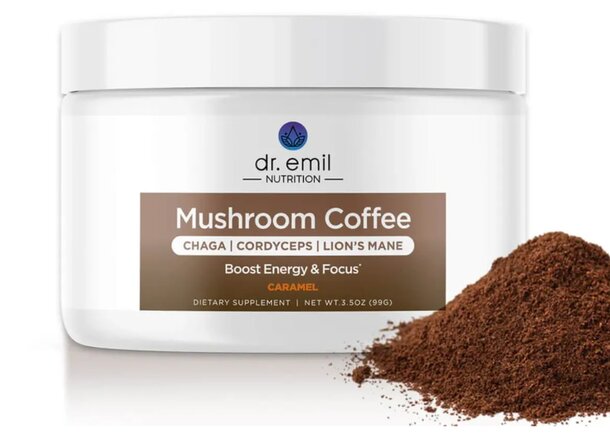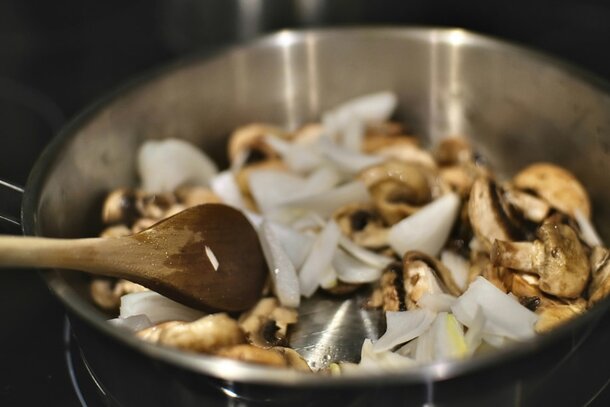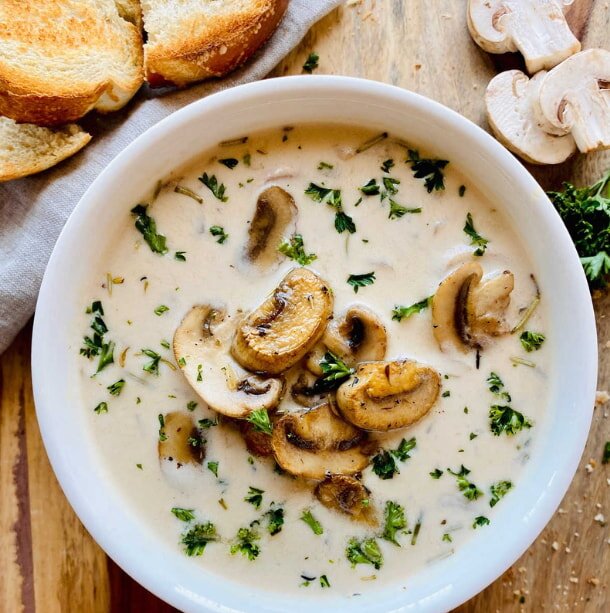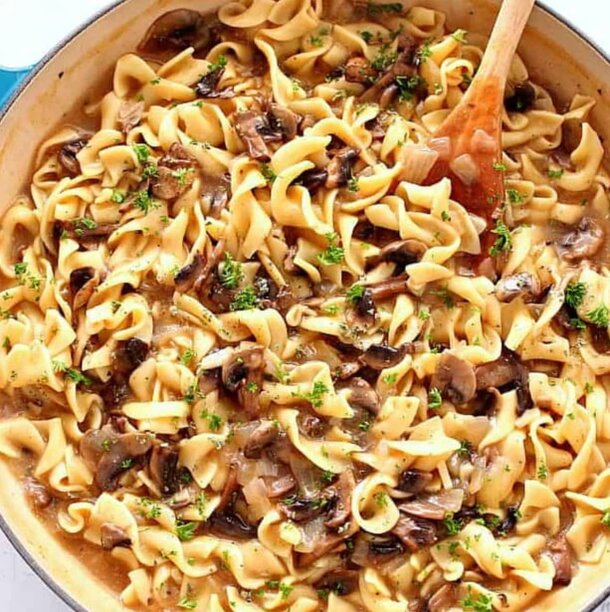Are Baby Bella Mushrooms Good For You?
Baby bella mushrooms rest on a counter in detailed image.
Few foods manage to be as humble yet as powerful as the mushroom—and among them, the baby bella stands out as a true kitchen hero. Found in everything from omelets to gourmet pastas, these small but mighty fungi are celebrated not just for their earthy, savory flavor but, for their surprising nutritional punch.
In this article, we’ll take a closer look at baby bella mushrooms—what they are, where they come from, and why they deserve a permanent spot in your fridge. You’ll learn about their impressive vitamin and mineral profile, their science-backed health benefits, and even how to prepare them in ways that maximize their flavor and nutrition. We’ll even tough on when they might not be good for you.
So whether you’re a long time mushroom lover or you’re just curious about the hype, this guide will tell you everything you need to know about one of nature’s most underrated superfoods.
What are Baby Bella Mushrooms?
You’ve likely seen these small, white and brown mushrooms in your kitchen or in the grocery store. Baby bellas, often called Cremini mushrooms, or brown mushrooms, seem to have become the poster child of the vast kingdom of fungi— this is likely due to their wide availability and balanced flavor.
Not only are they the poster child but they are also a literal child in the sense that they are essentially at the midpoint in their maturation process. The less mature version of them is the white button portobello mushroom and the more mature version is simply the portobello mushroom with a much more robust, meaty, taste. Crazy, right?
History & Health Benefits of Baby Bellas
Baby bellas have numerous health benefits ranging from boosted immunity to improved heart health, these little fungi are friends and here to help us. A testament to this lies in their long history of use. It is believed that they were first discovered by the ancient Greeks, who used them for a variety of medicinal purposes. During the Middle Ages, they spread their spores throughout Europe as a valuable culinary ingredient, and eventually made their way to North America in the late 19th century. I suppose we should all thank those ancient Greeks yet again for putting us on to these delicious little nuggets of goodness.
What is The Nutritional Value of a Baby Bella?
The USDA reports that 1 cup of baby bella mushrooms has 19 calories, 4g carbs, 2g protein, and 0.5g fiber. Daily value is based on a 2000 calorie diet. These mushrooms are low in calorie density, with only about 24 calories per 100g. Now that we have an idea of the macros, let’s zoom in on the micronutrients.
Which Vitamins and Minerals Are They Rich in?
Most mushrooms and especially baby bellas typically excel in this area of their benefits. Our bodies need various vitamins and minerals to thrive and while the exact amounts can vary slightly per serving, one should consider enriching themselves with the following micronutrients that the baby bella has to offer.
- Selenium: Selenium is a trace mineral that your body needs in small doses. It serves as a strong antioxidant defense for your body, as well as an immune support, helping to fight against various infections and illnesses. Additionally, selenium helps to regulate thyroid hormones, which control metabolism, energy, and growth. Lastly it has been linked to reproductive health and reduced inflammation
- Potassium: Baby bellas are high in potassium with about 300 milligrams per a 1 cup serving. Potassium is an essential mineral and electrolyte that helps to maintain proper hydration. It is necessary for normal muscle function. Not to mention it is a great way to support proper communication between nerves and muscles. Lastly, potassium assists in kidney function—filtering the blood and managing waste.
- Phosphorus: Baby bellas are loaded with phosphorus as well, which plays several critical roles in the body. For example, about 85% of the body’s phosphorus is stored in bones and in the teeth giving them structure and strength. Also, it is a key part in the production of ATP, which our cells use for energy.
Core Health Benefits of Baby Bellas

Image depicting a digital scale and measuring tape.
Immune Booster
Baby bellas support the immune system in a few key ways. Their high selenium content is essential for a strong immune response, and they also contain beta-glucans, a type of soluble fiber unique to mushrooms. Research has shown that beta-glucans can “activate” parts of the immune system, including macrophages and natural killer cells, enhancing the body’s ability to fight off pathogens.
Weight Management
Baby bellas are great for weight management. Their low calorie count, high water content, and decent amounts of protein and fiber make them very satiating, helping you to feel fuller while consuming fewer calories.
One popular approach is the “blendability” method—replacing part of the ground meat in dishes like burgers, tacos, or meatloaf with finely chopped mushrooms. Research from Johns Hopkins Bloomberg School of Public Health found that people who swapped mushrooms for meat over the course of a year lost an average of 7 pounds while feeling just as satisfied. It’s an easy, effective way to reduce calories and fat without sacrificing flavor or portion size.
Heart health
Baby bellas are a heart-friendly addition to your diet. They provide potassium, which supports healthy blood pressure by counteracting sodium’s effects, and their fiber content may help reduce bad cholesterol. In addition, and stated previously, baby bellas contain antioxidants like selenium and ergothioneine, which help protect blood vessels from oxidative stress and inflammation which are both large contributors to cardiovascular disease.
Looking for something else that is great for you?

Check out Dr. Emil's Mushroom coffee! This product packs in 3 all natural adaptogens known for their ability to bolster mental clarity, elevate focus, and support cognitive function. With an added herbal boost of ashwagandha, astragalus root powder, and panax ginseng extract you will experience a heightened resilience against stress and an enhanced sense of well-being. This holistically balanced, all natural, wellness boosting blend, promises a delightful taste of mushroom coffee goodness all for zero calories! Simply stir the coffee blend into hot water for a comforting and invigorating cup, or mix it into cold water over ice for a refreshing and revitalizing chilled beverage.
When are Baby Bellas Bad for You?
As we’ve covered, baby bellas have the potential to be an excellent addition to your diet. They contain very beneficial macro and micronutrients that will help your body perform to its highest standard…but can they be bad for you simultaneously?
The short answer is yes, just like anything else, when overconsumed, they can pose some risks—let’s cover them.
Generally speaking, it would be difficult to overconsume baby bellas. However, for the die-hard mushroom lover who also consistently eats other foods high in selenium, such as Brazil nuts, seafood, eggs, and whole grains, be sure to adhere to daily intake levels and even consider getting your levels checked. It is a condition that results from chronic selenium intoxication and can have symptoms such as fatigue, hair and nail damage or loss, and even neurotic effects.
Baby bellas can also pose a threat to safety when they have spoiled. The determining factor for whether or not your mushrooms have gone bad is a change in texture from firm and plump to slimy and sticky or even drying out. Also keep an eye out for bruises or excess moisture and your nose aimed towards identifying a fishy smell. These are all indicators that your baby bellas have spoiled and should not be consumed
Can you eat baby bella mushrooms raw?
This is a very valid question because you may have seen them served raw on salads or other dishes. Believe it or not, it is actually quite the controversial topic but the general consensus among mycologists (mushroom experts) and nutritionists is that it’s safer to cook them.
One reason for which is that mushrooms tend to have tough cell walls made up of a substance called chitin. Cooking helps break down these walls, making the micronutrients, such as covered above, much more available for your body to absorb.
Another reason to cook baby bellas is because they contain trace amounts of a potentially carcinogenic compound known as arginine. However, the compound is highly unstable and is significantly reduced by heat. Even though the trace amounts will pose little risk, it’s better to be safe than sorry.
How to Enjoy Your Baby Bellas
Speaking of cooking, we felt it was only right to compile a list of our top 3 ways that you can enjoy these tasty little treats; all this mushroom talk is getting us hungry for more!

Baby bella mushrooms being sauteed in a skillet with chunks of onion.
Simple Sauteed Baby Bella Mushrooms
This recipe for sauteed mushrooms is about as straightforward as it gets, and not to mention it’s delicious too! This recipe, which only calls for a few ingredients such as lemon juice, and olive oil, is ideal as a quick side dish or as a garnish for other dishes, such as pasta with parmesan cheese, or hamburgers. These will only take you about 15 minutes to cook in total, For an added flavor boost, finish with garlic and butter.

Sliced baby bellas rest on top of a bowl of cream of mushroom soup. Image courtesy of ar.inspiredpencil.com.
Cream of Mushroom Soup
Try this cream of mushroom soup for a filling main course or a heartier side dish. This dish uses two pounds of mushrooms and is made with fresh herbs, chicken stock, heavy cream and flour allowing for a thick and robust flavor. This is perfect for home-cooks looking for an easy weeknight meal that is delicious and nutritious.

Mushroom stroganoff is ready to be served. Image courtesy of www.crunchycreamysweet.com
Mushroom Stroganoff
A healthier version of beef stroganoff that is easily just as delicious with the umami goodness of mushrooms. You’ll need to compile the following ingredients: baby bellas (of course), vegetable stock, white wine, greek yogurt, flour, garlic, onions, butter and fresh herbs. This nostalgic comfort meal is yet another simple-to-make weeknight meal that will have everyone asking for more!
In Conclusion, Yes, Baby Bellas are Good for You!
Baby bella mushrooms are much more than a flavorful kitchen staple—they’re a nutritional powerhouse with benefits that span immunity, heart health, weight management and much more. Packed with key vitamins, minerals, antioxidants, and fiber, they offer a well-rounded boost for your body while remaining low in calories.
While moderation is always important—especially for nutrients such as selenium—baby bellas are generally safe and versatile, making them an excellent addition to nearly any diet. Whether you saute them, add them to soups, or blend them into your favorite recipes, these mushrooms bring both taste and health to the table! Including baby bellas in your meals is a simple, delicious way to support overall wellness.
